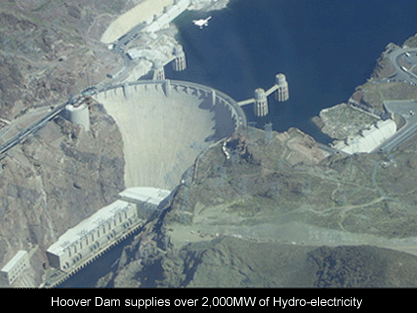Hydropower (or waterpower) harnesses the energy of moving or falling water. This is usually in the form of electricity from a dam, but it can be used directly as a mechanical force.
The term refers to a number of systems in which flowing water drives a hydraulic turbine or waterwheel. Water power has been around for awhile, and prior to the widespread availability of commercial electricity, it was used for milling, textile manufacture, and the operation of sawmills. Water is currently the leading renewable energy source used by electric utilities to generate electric power. Plants operate where suitable waterways are available, although many of the best of these sites have already been developed. This form of power currently supplies about 715,000 MWe or 19% of world electricity. The power generated from these stations is normally applied to peak-load demand, because it is readily stopped and started. In other words, it is a very reliable form of electricity.

Generating electricity using water has several advantages. The major advantage is that water is a source of cheap power, and very efficient. In addition, because there is no fuel combustion, there is little air pollution in comparison with fossil fuel plants and limited thermal pollution compared with nuclear plants.
Large dams are still being designed, however hydroelectric power is probably not a major option for the future of energy production in the developed nations because most major sites within these nations with the potential for harnessing gravity in this way are either already being exploited or are unavailable for other reasons such as environmental considerations. Like other energy sources, the use of water for generation has limitations, including environmental impacts caused by damming rivers and streams, which affects the habitats of the local plant, fish, and animal life.
Power from water needs to be carefully thought about, as water is now considered a precious commodity and using this resource cannot be at the expense of diversion from drinking or essential agriculture.
